Article paru dans https://nordvpn.com/fr. C’est en anglais, bon courage.
Best browsers for privacy and security in 2020
Dec 02, 2019 · 9 min. de lecture

Websites, advertisers, ISPs, and government agencies track every click you make. But is there a way to prevent it? How could you make browsing safer and more private? Check the list below to choose the best browser for privacy.
Contents
- Rating system
- Browsers
- Microsoft Edge
- Opera
- Chrome
- Chromium
- Safari
- FreeNet
- Vivaldi
- Waterfox
- Brave
- Tor Browser
- Epic
- Firefox
- Conclusion: the best browser for privacy
- Other privacy tools
Rating system
We’ve given each browser a rating of one to five stars (⭐). These ratings are the author’s subjective evaluation of the browser’s security, privacy, and general functionality. A five-star browser may not be perfect, but it represents one of the most privacy-oriented browsers out there with great user features.
We have also listed the browsers from worst to best. However, we are not implying that number one is the single best privacy browser. The best browser for you will depend on your needs.
Browsers
12. Microsoft Edge
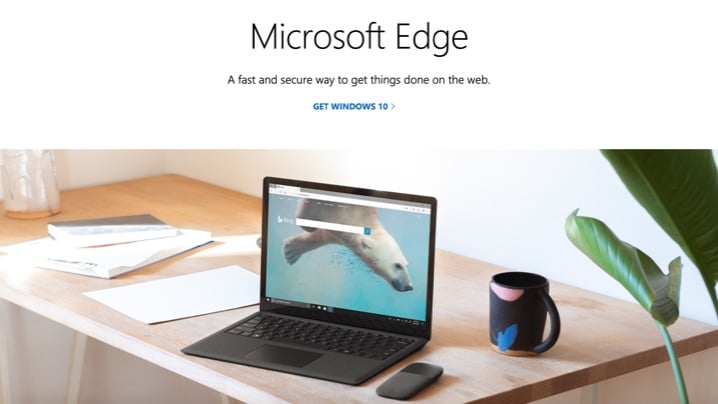
Edge is a successor to the old and obsolete Internet Explorer. However, it doesn’t do much to reclaim its long-gone online dominance. Edge is only updated twice a year, which is ridiculous as malware, scam and privacy violation techniques advance so rapidly. Most modern browsers get updated once per month or two, so Edge really lags behind.
That being said, Edge still has some security and privacy features, albeit quite basic ones. Edge allows you to block pop-ups and send “Do Not Track” requests. It also runs in a sandbox, which contains processes within the browser itself and minimizes the chance that malicious sites could affect users. Its limited extension support, while inconvenient, also means that there is a lesser possibility of installing a malware extension. Also, Microsoft recently integrated the long-awaited tracking protection feature.
However, with infrequent updates and no advanced security and privacy features, it does not qualify as an excellent browser to stay private. Also, both of Microsoft’s browsers are closed-source, so there’s no telling what types of surveillance widgets might lurk within them.
Edge is available for Windows, Windows Mobile, Xbox One, Android and iOS.
Our rating (out of 5): ⭐
11. Opera

Opera runs on the Chromium system and boasts a variety of security features to make your browsing experience safer, such as fraud and malware protection as well as script blocking. Moreover, it offers updates every 4 or 5 weeks.
The questionable component is the free built-in VPN that Opera acquired in 2016. Like many VPNs offered as free extras (here’s looking at you, Facebook!), it tracks bandwidth and usage logs. Besides, Opera itself is owned by a China-based company, and this is the country with not the best internet freedom and privacy record. Moreover, Opera collects and monitors user data by using its own or third-party tools. Also, they might share your data with third-parties. Even though you may add some additional layers of privacy and protection by customizing your settings, it is quite tricky with Opera, and they are not enabled by default.
Opera is available for Windows, macOS, and Linux.
Our rating (out of 5): ⭐
10. Chrome
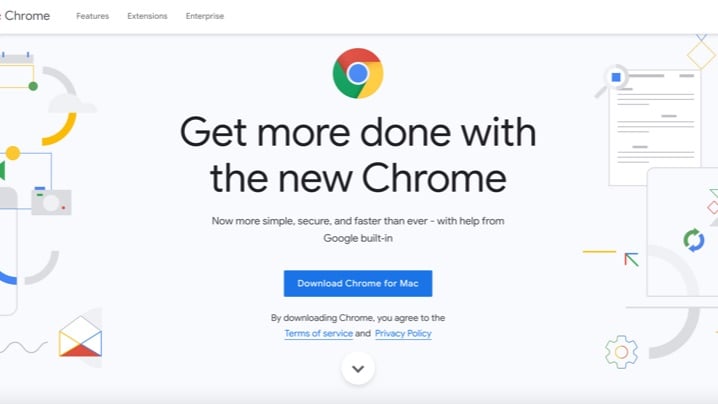
Google Chrome is convenient, popular and functional. Moreover, the company constantly updates its security features, so it can be considered good in this regard. However, its privacy is lacking. Google is notorious for data collection, tracking, and other privacy violations. One of its primary sources of revenue is user profiling for ad targeting. You can’t expect a very private browser from such a company. Moreover, it is not open-source, so we can’t tell if or how Google might be tracking its users (Chromium – the browser Chrome is based on and the next one on this list – does have open source code available).
Of course, you can dive deep into Chrome’s complicated privacy preferences and choose among the many available extensions for additional security and privacy. You will also have to spend a considerable amount of time researching them to make sure they’re secure, as not all extensions can be trusted.
If you do decide to use Chrome, you may want a VPN browser extension to go with it to boost your security and privacy.
Chrome is available for Windows, Linux, macOS, iOS, and Android.
Our rating (out of 5): ⭐⭐
9. Chromium

While Chromium has connections to Google, the tech giant does not control how others use Chromium’s open-source code, so it’s not necessarily subject to the company’s data gathering methods. Chromium is also a less polished browser, and you will need to do quite a lot of manual work to customize it and make it run smoothly. You will also have to invest more time in learning its functionalities, finding out the most recent updates and risks.
The frequency of Chromium’s updates is unmatched, with a new one being released every single day. This is great for patching up vulnerabilities as soon as they emerge, but the updates require manual installation, which means that end-users must be vigilant to stay as secure as possible.
Moreover, there are a lot of Chromium-based malicious browsers online. They might infect you with malware, steal your data and flood you with pop-ups and unwanted redirects.
Chromium is available for Windows, macOS, Linux, and Android.
Our rating (out of 5): ⭐⭐⭐
8. Safari
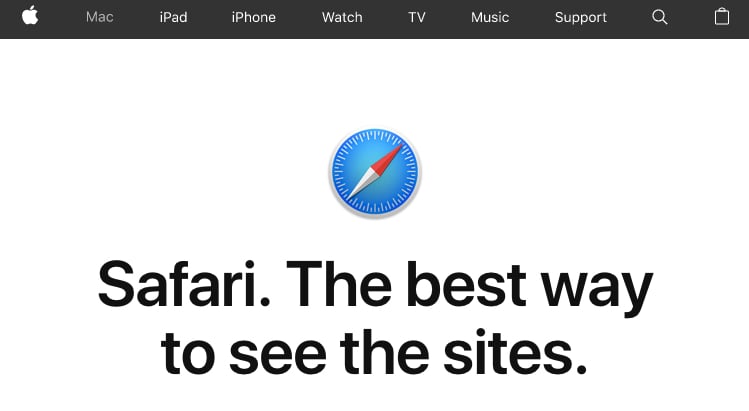
Safari does relatively well in terms of maintaining your online security. It has plenty of small but useful features, like a password generator, a private browsing mode that uses DuckDuckGo by default, machine learning based protection and anti-fingerprinting tools. It also runs your tabs in separate sandboxes, which helps prevent a malicious code damaging the entire browser or accessing your data. However, Apple, which owns safari, has been caught collecting users’ browsing history even when they use private browsing. Therefore, this feature is not 100% reliable.
Safari does use the open-source Webkit framework, but this is limited to its function as a rendering engine. The rest of Safari is closed-source, which means that you can’t see its code and what might hide in it.
Apple also participated in the NSA’s PRISM program, which collected communications from US internet companies. This is an additional red flag regarding the privacy of their products.
Safari is available for macOS and iOS.
Our rating (out of 5): ⭐⭐⭐
7. FreeNet

Freenet is a peer-to-peer platform designed by computer scientist Ian Clarke. It is a good option for censorship-resistant communication as it uses decentralized network and encryption to keep and deliver data. It also has free software to preserve confidentiality. Its mode of operation reminds Tor Browser as it has its own Freenet network with content accessible only by this browser.
Freenet can also be employed for anonymous file-sharing. Files are divided into smaller particles and stored across multiple Freenet network nodes. However, the download and upload speeds are slower as the request goes across few intermediary nodes to preserve anonymity.
It also supports OpenNet and Darknet connections. Opennet works in the similar way as the Darknet. The difference is that its connections are made between random users with the Opennet function enabled rather than the ones, who know each other.
With Freenet you can only open Freesites, which are hosted on its network. They can contain only static content due to a slower bandwidth. Thus, Freenet is more of an advanced anti-surveillance solution, which might be too complex for an average user.
Freenet is available for Windows, macOS, Linux (cross-platform).
Our rating (out of 5): ⭐⭐⭐⭐
6. Vivaldi
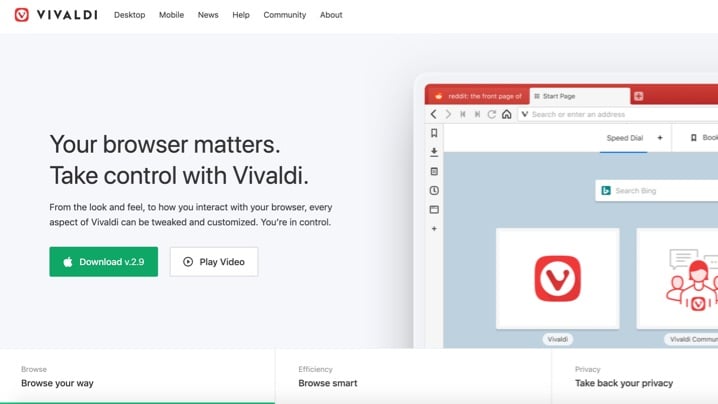
With its highly customizable interface and functionality, many consider Chromium-based Vivaldi to be the power user’s privacy browser.
The extensive customization options extend into Vivaldi’s privacy settings as well, allowing users to choose their default search engine and a wide array of other settings that impact your privacy. You can, for example, set different default search engines for when you’re using the regular and private browsing modes, and create different security settings for both of those search engines.
Although Vivaldi offers end-to-end encryption for syncing between devices, it does not have mobile device support yet. Due to its structure, it is also compatible with most Chrome browser extensions. This is both good and bad, as they can provide functionality and security but can also introduce malware.
Vivaldi is available for Windows, macOS, Linux and Android.
Our rating (out of 5): ⭐⭐⭐⭐
Sur le même sujet Le guide ultime du navigateur Tor Articles de fond · 4 min. de lecture Les meilleurs navigateurs pour la confidentialité et la sécurité Articles de fond · 9 min. de lecture
5. Waterfox

Waterfox is probably the most popular alternative browser based on the open-source Firefox code. It was designed to take full advantage of 64-bit Windows computers back when Mozilla only offered a 32-bit version.
Waterfox is more privacy-focused than Firefox. It offers tracking protection and removes many Firefox features that decrease users’ privacy, such as Pocket, Telemetry, data collection and startup profiling. It is also able to erase all online data on your system without the use of add-ons.
However, Waterfox is updated less frequently than Firefox. Also, its webpage data runs through Google’s SafeBrowsing service, although you can opt out of this if you wish.
Waterfox is available for Windows, macOS, Linux, and Android.
Our rating (out of 5): ⭐⭐⭐⭐
4. Brave
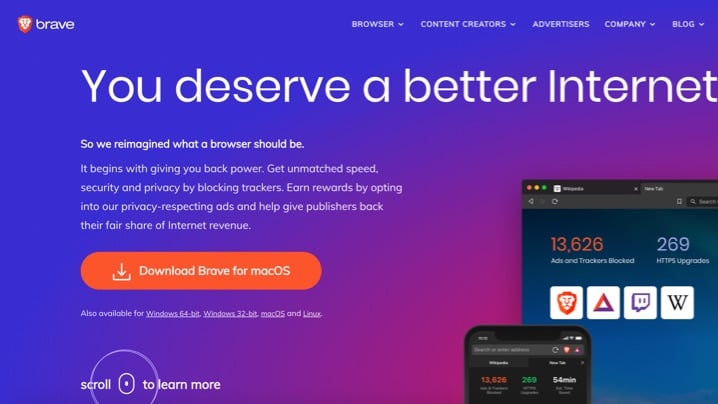
Brave is a relatively recent Chromium-based browser that packs quite a punch. It’s lightweight but offers a bunch of features, including a built-in ad-blocker, a password manager, tracking protection, a script blocker, and one-click anti-fingerprinting functionality. It also can automatically upgrade your connection to HTTPS.
Brave now supports most Chrome extensions. While this is great for making the browser convenient and functional, users should still exercise caution and make sure they use extensions that respect their security and privacy.
Although Brave is open-source and nominally de-Googled, more suspicious users may not trust its Chromium base. The browser’s advertising platform is also controversial, as Brave serves ads that profit the browser over any hosted by the sites you visit. However, the system works on the opt-in basis so users can contribute voluntary sums to the publishers they value the most.
Update: Recently, Brave was caught autocompleting URLs of certain cryptocurrency sites with their affiliate links and profiting from it. A Twitter user discovered this when he tried accessing binance.us, which Brave filled with their affiliate link. This granted Brave commissions for every visit using the link. While this was not technically a grave privacy violation, it raises questions about the transparency of this browser. Therefore, we have decreased the rating by one star.
Brave is available for Windows, macOS, Linux, Android, and iOS.
Our rating (out of 5): ⭐⭐⭐
3. Tor Browser
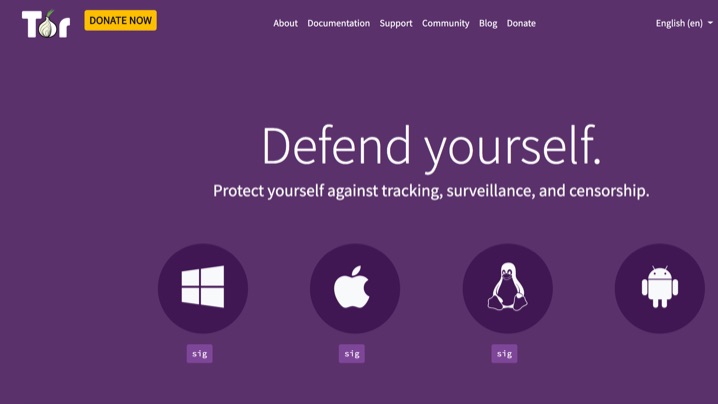
Endorsed by Edward Snowden, Tor is arguably the best known privacy-focused browser. It prevents unauthorized snooping with the help of its built-in hidden relay servers, comes with pre-configured security features, and can run from a USB flash drive.
Among other things, Tor is an excellent choice for avoiding fingerprinting. As long as you use the standard settings, don’t add extra add-ons, and stick to the default window size (not the full-screen mode), one Tor Browser looks identical to another. Tor also protects you from tracking and automatically clears your cookies and history.
Tor encrypts your traffic three times for three different nodes, which are decentralized and operated by volunteers. Every node removes just a particular layer of encryption, so the full message cannot be accessed in any of them. As the system is not concentrated in the hands of a single company, it is also difficult to shut it down or intercept traffic. However, due to this complicated connection procedure, its connection speed is quite slow. Due to security and privacy reasons, it does not support the vast majority of plug-ins.
Tor aims to protect your privacy rather than focusing on security. It does not have anti-malware technology and blocks plug-ins by design. You should also be careful when changing its settings as you could compromise its privacy. Some of Tor’s settings should only be changed by advanced users.
Tor Browser is available for Windows, macOS, and Linux.
Our rating (out of 5): ⭐⭐⭐⭐
2. Epic
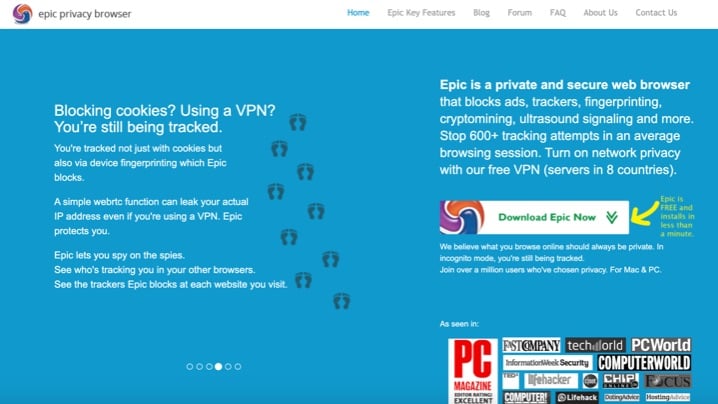
The philosophy behind the Epic browser is that it should ship with every privacy setting turned on by default. It’ll send “Do Not Track” requests, block cookies, ads, and data-tracking web analytics systems, and search via DuckDuckGo right from the start. You can configure the browser to improve its convenience at the expense of your privacy.
Epic takes this approach seriously, delivering on their promise of “extreme privacy”: no auto-syncing, no spell-check, no auto-fill, no plug-ins – these and many other features come shut off by default or are simply unavailable. It also does not store your history, login data, databases and other info. It does not cache your data and does not save links for the autosuggestion when typing in an address. The browser also blocks RTC calls, which might reveal your IP address. It can make Epic hard to use for some users, but it’s undoubtedly a very serious privacy tool.
Epic also can proxy search via its servers and also automatically prioritizes SSL connections. It also makes your privacy gains measurable by tracking how many cookies it has blocked and who tried to send them.
The only drawback is that Epic is based on the Chromium code, and it is not open-source to the public. Because the Chromium source code was created by Google, there is no 100% guarantee that it will always remain independent.
Epic is available for macOS and Windows.
Our rating (out of 5): ⭐⭐⭐⭐⭐
1. Firefox

Firefox is a convenient, fast and lightweight browser. Moreover, it is the only mainstream open-source browser, and its code has been thoroughly researched and scrutinized by the community.Thus, you can be sure that there are no dodgy widgets hidden inside.
Firefox is also quite secure. Like other major market players, it offers a private browsing mode that includes tracking, malware and phishing protection, pop-up blocking, and anti-fingerprinting protection. You can use its extensive customization possibilities pretty easily, but just be sure to disable the telemetry function, which sends your usage and performance data to Mozilla. Firefox also has an impressive collection of security-focused add-ons that can be used to make its experience safer.
Firefox contains some functions that might concern privacy-oriented users, like Pocket, Telemetry, and startup profiling. However, you can disable them by tweaking the settings.
Firefox is available for Windows, macOS, Linux, Android, and iOS.
Our rating (out of 5): ⭐⭐⭐⭐⭐
Conclusion: the best browser for privacy
With privacy settings slightly tweaked and a few security add-ons installed, Firefox is the best private browser solution among mainstream browsers with greater extension compatibility and ease of use. If your anonymity needs are more advanced or you want to access the dark web, Tor is the one you’re looking for.
However, please bear in mind that no safe browser is perfect – each of them has its respective strengths and weaknesses. Research your favorites on this list to see which is right for you. Use them in combination with other tools, such as tracker blockers and VPNs.
Other privacy tools
When choosing your new, more-secure browser, you may also want to consider which extensions it does or doesn’t work with. There are a ton of excellent privacy tools out there, but they don’t all work with every browser. To find the right browser privacy extensions for you, click here.
Another essential privacy tool is a VPN. NordVPN’s encrypted VPN tunnel will hide your traffic from hackers, ISPs, and governments, and protect you from numerous attacks as well. Use it in combination with a secure browser to ensure optimal online browsing security.







Les commentaires sont fermés.